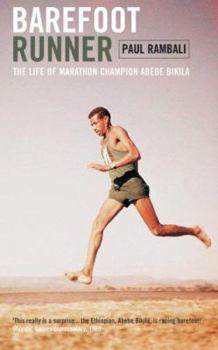Barefoot Runner: The Life of Marathon Champion Abebe Bikila
"It's an astonishing sight, I must say: the Ethiopian, Abebe Bikila, is racing barefoot."--BBC Radio Olympic commentary, Rome, 1960 Abebe Bikila was the first black African to win an Olympic gold medal. He won the marathon running barefoot in Rome in 1960 and won again wearing shoes in Tokyo in 1964, becoming the first person to win the most grueling of all human contests twice. Born into bitter poverty in rural Ethiopia in 1932, at sixteen Bikila...
Format:Paperback
Language:English
ISBN:1852429046
ISBN13:9781852429041
Release Date:June 2007
Publisher:Serpent's Tail
Length:315 Pages
Weight:1.25 lbs.
Dimensions:0.9" x 5.4" x 8.4"
Customer Reviews
3 ratings
Excellent and interesting story
Published by Thriftbooks.com User , 14 years ago
I found this to be an excellent book that held my interest completely. Having no background knowledge of Abebe Bikila or even much knowledge on Ethiopian history, I can't say how embellished the story is. What I can say is that I found the combination of history and context and story to be wonderfully combined and made for a much more complete story than other books I have read.
Terrific read
Published by Thriftbooks.com User , 17 years ago
I loved it - this book had a much more interesting story, and better style, than almost any other sports book that I have ever read.
A fine work.
Published by Thriftbooks.com User , 17 years ago
I was disappointed to find out that this was historical fiction after i read it, but Rambali does a fine job. Besides the fact that he does portray Bikila as a pawn rather than his own man shows the meekness behind one of athletics' greatest champions, and though it may shatter some misconceptions about Bikila, it is a true reflection of the times in which he ran. (I did think however that Rambali could have painted a stronger image of Bikila, to show some more courage instead of constant confusion.) When I first started reading it, I did not like it starts off a bit mysteriously and you have to wait a while before you figure out what Rambali's going on about and why he is doing so. I wanted Rambali just to focus on Bikila, but he actually wove together two stories: Bikila's and his coach Omni Niskanen's, all surrounded by the political and other turmoil of the time. I found this annoying because I wanted it to go straight to the running (which is a tall order, of course). But as I read on, I quickly realized the beauty behind this intertwining that results in their glorious meeting and friendship. The political goings-on that are included in the book help to give a reader a sense of wider context, which results in an even greater appreciation for this story and the achievements it documents. Rambali does do the story quite well, weaving in many elements that make a riveting story. He splits the story up into short chapters so that it's easy to pick up and put down without losing too much track of the story. One of my favorite details of the book was that Rambali managed to put the two marathons on chapter 26 and 42, something that you don't notice unless you initially notice that the first Olympic marathon is on Chapter 26. I agree with the other reviewer that there are definitely embellishments, and it's difficult to separate the true from false. But just like 'Girl with a Pearl Earring', the reader can accept the story as a logical interpretation of history, and in a time of a lack of great running literature, this book was quite a find.






